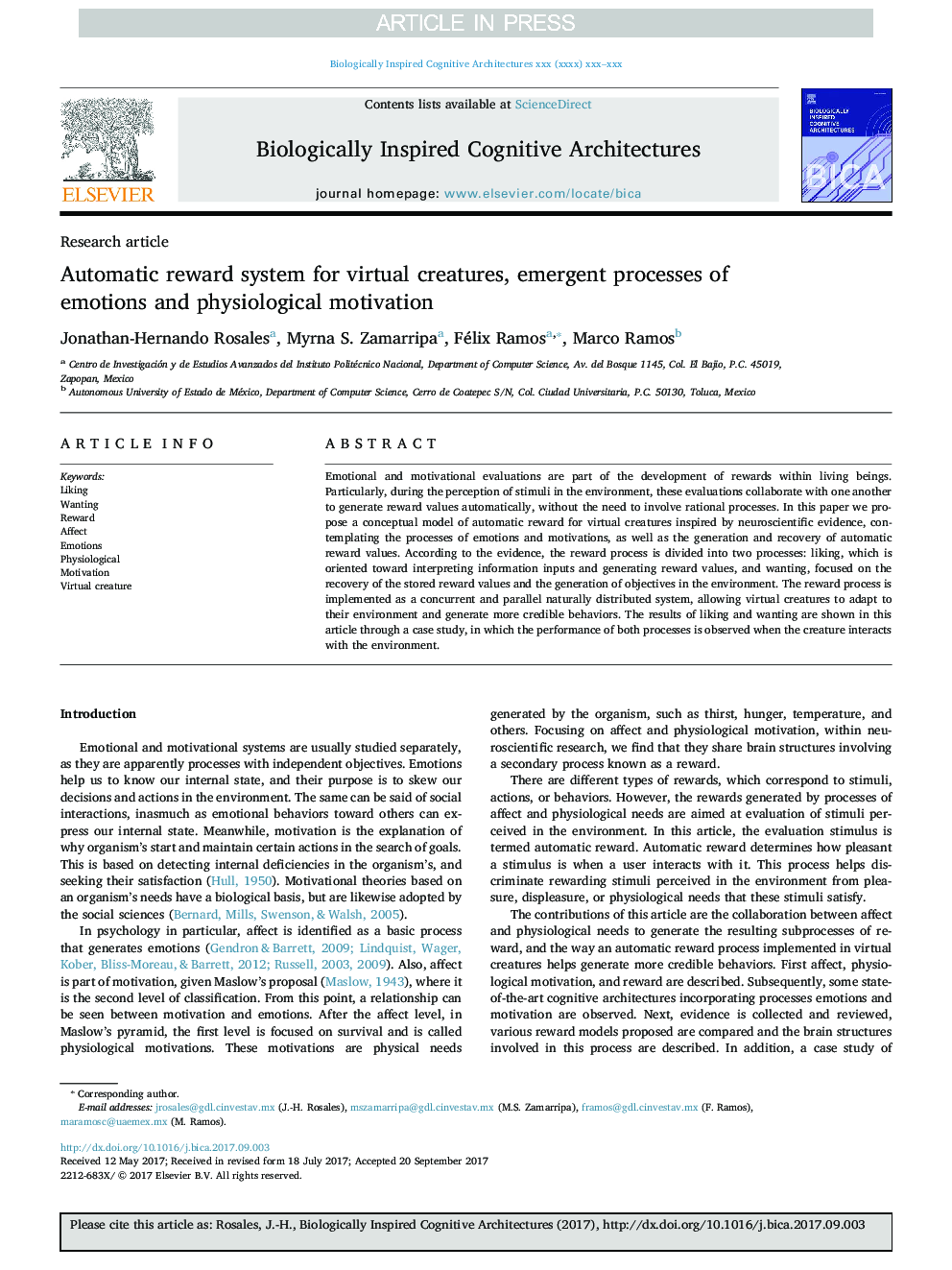| کد مقاله | کد نشریه | سال انتشار | مقاله انگلیسی | نسخه تمام متن |
|---|---|---|---|---|
| 6853470 | 1437186 | 2017 | 16 صفحه PDF | دانلود رایگان |
عنوان انگلیسی مقاله ISI
Automatic reward system for virtual creatures, emergent processes of emotions and physiological motivation
ترجمه فارسی عنوان
سیستم پاداش خودکار برای موجودات مجازی، فرآیندهای ظهور احساسات و انگیزه فیزیولوژیکی
دانلود مقاله + سفارش ترجمه
دانلود مقاله ISI انگلیسی
رایگان برای ایرانیان
کلمات کلیدی
عادت ماهیانه میخواهم جایزه، تاثیر می گذارد، احساسات، فیزیولوژیکی، انگیزه، موجودی مجازی،
ترجمه چکیده
ارزیابی های احساسی و انگیزشی بخشی از توسعه پاداش درون موجودات زنده است. به طور خاص، در طول درک محرک ها در محیط، این ارزیابی ها با یکدیگر برای ایجاد ارزش پاداش به صورت خودکار، بدون نیاز به فرآیندهای منطقی همکاری می کنند. در این مقاله، ما یک مدل مفهومی پاداش خودکار برای موجودات مجازی که الهام داده شده از شواهد علمی عصبی، در نظر گرفتن روند احساسات و انگیزه ها، و نیز تولید و بازیابی ارزش پاداش خودکار است، پیشنهاد می کنیم. بر طبق شواهد، فرایند پاداش به دو فرایند تقسیم می شود: میل، که به سمت تفسیر ورودی های اطلاعات و ایجاد ارزش پاداش، و تمایل به تمرکز بر بازیابی ارزش پاداش ذخیره شده و تولید اهداف در محیط است. فرآیند پاداش به عنوان یک سیستم به طور موازی به طور طبیعی توزیع شده و به صورت موازی اجرا می شود و موجودات مجازی را قادر می سازد تا با محیط خود سازگار شوند و رفتارهای قابل اعتمادتری کسب کنند. نتایج دلخواه و خوشی در این مقاله از طریق یک مطالعه موردی نشان داده شده است، که در آن عملکرد هر دو فرایند زمانی مشاهده می شود که موجودات با محیط برخورد می کنند.
موضوعات مرتبط
مهندسی و علوم پایه
مهندسی کامپیوتر
هوش مصنوعی
چکیده انگلیسی
Emotional and motivational evaluations are part of the development of rewards within living beings. Particularly, during the perception of stimuli in the environment, these evaluations collaborate with one another to generate reward values automatically, without the need to involve rational processes. In this paper we propose a conceptual model of automatic reward for virtual creatures inspired by neuroscientific evidence, contemplating the processes of emotions and motivations, as well as the generation and recovery of automatic reward values. According to the evidence, the reward process is divided into two processes: liking, which is oriented toward interpreting information inputs and generating reward values, and wanting, focused on the recovery of the stored reward values and the generation of objectives in the environment. The reward process is implemented as a concurrent and parallel naturally distributed system, allowing virtual creatures to adapt to their environment and generate more credible behaviors. The results of liking and wanting are shown in this article through a case study, in which the performance of both processes is observed when the creature interacts with the environment.
ناشر
Database: Elsevier - ScienceDirect (ساینس دایرکت)
Journal: Biologically Inspired Cognitive Architectures - Volume 22, October 2017, Pages 51-66
Journal: Biologically Inspired Cognitive Architectures - Volume 22, October 2017, Pages 51-66
نویسندگان
Jonathan-Hernando Rosales, Myrna S. Zamarripa, Félix Ramos, Marco Ramos,
